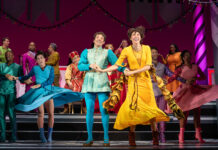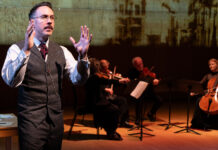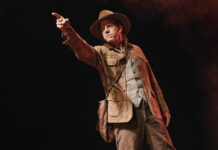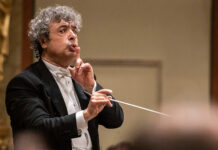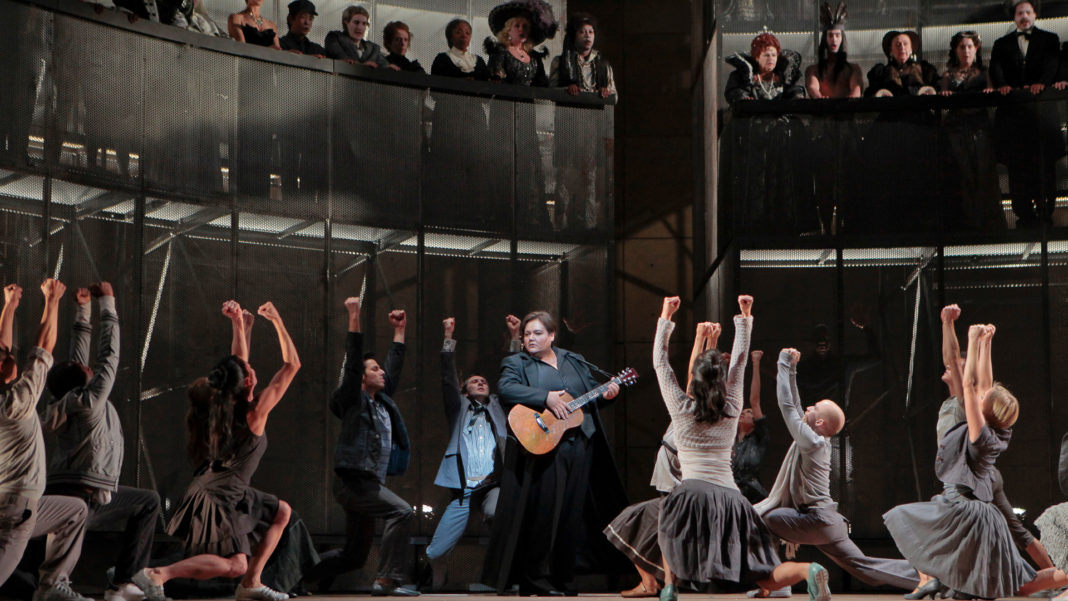Week 34 at the Met is the first of a two-week series they are calling From the Baroque to the Present: A Two-Week Tour of Opera History.
This week’s series launches with a work by George Frideric Handel from 1725 and concludes with a work by Richard Wagner from 1868 (in a production that hasn’t been streamed yet).
Each production becomes available at 7:30 PM EDT/4:30 PM PDT on the Metropolitan Opera website. Every opera remains available for 23 hours. They are heavily promoting their Met Stars Live in Concert series and recently announced the cancellation of the full 2020-2021 season, so you’ll have to go past those announcements and promos to find the streaming productions. Schedules and timings may be subject to change.
If you read this column early enough on November 2nd, you might still have time to catch the 2011-2012 season production of Satyagraha that concludes last week’s Politics in Opera series.
Monday, November 2 – Handel’s Rodelinda
Conducted by Harry Bicket; starring Renée Fleming, Stephanie Blythe, Andreas Scholl, Iestyn Davies, Joseph Kaiser and Shenyang. This revival of Stephen Wadsworth’s 2004 production is from the 2011-2012 season. This is an encore presentation of the production that was previously available on June 14th.
Handel’s opera had its world premiere in London in 1725. The libretto is by Nicola Francesco Haym who revised Antonio Salvi’s earlier libretto. Scholars have long considered Rodelinda to be amongst Handel’s finest works.
Queen Rodelinda’s husband has been vanquished and she is plotting her revenge. Multiple men have plans to take over the throne, but they have Rodelinda to contend with who is maneuvering herself to prevent that from happening. She is still faithful to her husband who is presumed dead.
Fleming and Blythe appeared at the Met in these role in the first revival of this production in 2006.
James R. Oestreich, in his review for the New York Times, said of Fleming’s return to Rodelinda, “But it would be asking too much of a singer like Ms. Fleming to revamp her technique in midcareer, so there was inevitably some disjunction between stage and pit. Ms. Fleming painted her coloratura in broad strokes, but it was enough that she threw herself and her voice wholeheartedly into the considerable drama.”
Tuesday, November 3 – Gluck’s Orfeo ed Euridice
Conducted by James Levine; starring Danielle de Niese, Heidi Grant Murphy and Stephanie Blythe. This Mark Morris production is from the 2008-2009 season. This is an encore presentation of the production that was previously available on June 3rd.
Once again the myth of Orpheus inspired a composer. Christoph Willibald Gluck’s opera, which premiered in Vienna in 1762, has a libretto by Ranieri de’ Calzabigi. (Others who have been so inspired include Haydn, Lizst and Stravinsky. The story is also the inspiration for the Tony Award-winning musical Hadestown.)
The Orpheus story is about a man who suddenly loses the love of his life, Euridice. He travels to the underworld to find her. He can bring her back, but only if he truly trusts in her love.
Anthony Tomassini, in his New York Times review of this production, began his review with singular praise for Blythe: “With each performance the American mezzo-soprano Stephanie Blythe gives, it becomes increasingly apparent that a once-in-a-generation opera singer has arrived. Ms. Blythe’s latest triumph came on Friday night at the Metropolitan Opera: a vocally commanding and deeply poignant portrayal of Orfeo in a revival of Mark Morris’s 2007 production of Gluck’s sublime masterpiece Orfeo ed Euridice. This was Ms. Blythe’s first performance of Orfeo, a touchstone trouser role for many mezzo-sopranos, and she already owns it.”
Wednesday, November 4 – Mozart’s Idomeneo
Conducted by James Levine; starring Nadine Sierra, Elza van den Heever, Alice Coote, and Matthew Polenzani. This revival of the 1982 Jean-Pierre Ponnelle production from the 2016-2017 season. This is an encore presentation of the production that was previously available on May 18th and October 4th.
Mozart’s opera had its world premiere in 1781 in Munich and has a libretto by Giambattista Varesco.
Idomeneo tells the story of Idomeneus, the King of Crete, who in order to survive at sea promises Poseidon he will kill the first man he sees upon being rescued. His son, Idamante, learns that his father is in serious danger and fears he has perished. Mourning his father at the beach, he is overjoyed to see that he has survived. But in doing so becomes the first man his father sees. That’s when the story gets good!
George Grella, writing in New York Classic Review, said of Nadine Sierra’s performance, “Her voice balanced youthful shine and, just under the surface, deep feeling. She was incandescent all night, singing with great ease and richness, and modulating naturally between moods of loss, love, regret, and pride.”
Thursday, November 5 – Rossini’s Semiramide
Conducted by Maurizio Benini; starring Angela Meade, Elizabeth DeShong, Javier Camarena, Ildar Abdrazakov and Ryan Speedo Green. This is a revival of John Copley’s 1990 production from the 2017-2018 season. This is an encore presentation of the production that was previously available on June 16th.
Voltaire’s Semiramis was the inspiration this Rossini opera. The libretto is by Gaetano Rossi. Semiramide had its world premiere in 1823 in Venice. This was the composer’s final Italian opera.
Queen Semiramide is a troubled and complicated woman. She and her lover, Assur, killed her husband, King Nino. Their son, Ninius, disappears and is presumed dead as Semiramide ascends to the throne. Years later she becomes enamored with a young warrior named Arsace. Guess who he turns out to be?
David Wright, writing in New York Classical Review, raved about Meade’s performance.
“Soprano Angela Meade anchored the cast with a fearless performance in the title role of the morally compromised and lovestruck queen, issuing a blizzard of sixteenth and thirty-second notes and dizzying leaps with expressive power to back them up.”
Friday, November 6 – Verdi’s La Forza del Destino
Conducted by James Levine; starring Leontyne Price, Giuseppe Giacomini, Leo Nucci and Bonaldo Giaiotti. This John Dexter production is from the 1983-1984 season. This is an encore presentation of the production that was previously available on June 18th and 19th.
This frequently performed Verdi opera had its world premiere in 1862 in St. Petersburg, Russia. The libretto is by Francesco Maria Piave, based on an 1835 Spanish drama, Don Álvaro o la fuerza del sino by Ángel de Saavedra.
Leonora is the daughter of the Marquis of Calatrava. She falls in love with Don Alvaro, but her father is dead-set against their getting married. A tragedy befalls all three leaving Leonora to find solace in a monastery.
This was one of Price’s greatest roles throughout her career. Bernard Holland, writing in the New York Times, raved about her performance.
“This was truly Miss Price’s evening. There were some jolting shifts of register, and Miss Price must protect her fragile upper notes with tender care; but her dramatic presence on stage and the overall impact of her singing went far beyond matters of technique. ‘Madre, pietosa Vergine’ had a stunning muted eloquence, and ‘Pace, pace, mio Dio!’ at the end had a sonorous beauty and power of communication that this listener – and I think everyone else in attendance – will think back upon for many years to come.”
Saturday, November 7 – Gounod’s Roméo et Juliette
Conducted by Plácido Domingo; starring Anna Netrebko, Roberto Alagna, Nathan Gunn and Robert Lloyd. This revival of Guy Joosten’s 2005 production is from the 2007-2008 season. This is an encore presentation of the production that was previously available on July 23rd.
Shakespeare’s Romeo and Juliet served as the inspiration for this five-act opera by Charles Gounod that had its world premiere in Paris in 1867. The libretto was written by Jules Barbier and Michel Carré.
The opera closely follows Shakespeare’s play about two star-crossed lovers from warring families. Their love only inflames the animosity between the Montagues and the Capulets. No matter what the young lovers do to be together, fate always seems to find a way to make their love impossible. When that happens, tragedy follows.
In her review for the New York Times, Anne Midgette said of the two leads:
“You are not going to hear much better singing than this today. True, Anna Netrebko and Roberto Alagna can both be faulted. She is a little wild, flinging herself into roles and about the stage (especially, on Tuesday, at her first entrance); he has a certain emotional bluntness, and a certain monochrome tone. So much for the obligatory criticism. The bottom line is that Ms. Netrebko produced a luscious sound that you wanted to bathe in forever, especially in her first-act duet with Mr. Alagna. The ultimate measure for a singer should be, Is this a sound you want to listen to? The answer here was yes.”
Sunday, November 8 – Wagner’s Die Meistersinger von Nürnberg – March 28th
Conducted by James Levine; starring Annette Dasch, Johan Botha, Paul Appleby and Michael Volle. This revival of Otto Shenk’s 1993 production is from the 2014-2015 season.
Richard Wagner’s Die Meistersinger von Nürnberg had its world premiere in Munich is 1868. As with his other works, Wagner wrote the libretto. It is also a rare comedy from the composer. The opera is one of Wagner’s longest running nearly four-and-a-half hours.
At stake in the opera is the love of a young girl named Eva. She has been betrothed to whomever wins a singing contest. Walther von Stolzing is desperately in love with Eva and wants to compete, but the song he wants to sing doesn’t conform to the rules set out by the competition. With the help of a cobbler named Hans Sachs, he hopes to overcome the opposition to him, win the contest and ultimately marry Eva.
In his review for the New York Times, Anthony Tommasini raved about Johan Botha in the role of Walther. “The powerful tenor Johan Botha has excelled in the demanding role of Walther, the restless knight who has come to Nuremberg, where he instantly falls for Eva, the lovely daughter of Pogner, the wealthy goldsmith. He did so again on this night. Mr. Botha has a very hefty physique. He does not cut the figure of the dashing young knight of Wagner’s imagination. Yet he sang with so much romantic allure and freshness, especially during the glorious ‘Morning Dream Song’ (as Sachs names it), that Mr. Botha seemed the essence of a young man in love.”
That’s the full line-up for Week 34 at the Met – our first half of the Two-Week Tour of Opera History. Next week’s operas begin with a work by Tchaikovsky from 1892 and concludes with an opera from 2016 composed by Adés.
Enjoy the operas and enjoy your week.
Photo: Stephanie Blythe in Orfeo ed Eridice (Photo by Ken Howard/Courtesy Metropolitan Opera)


